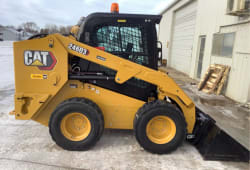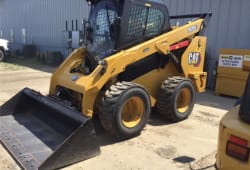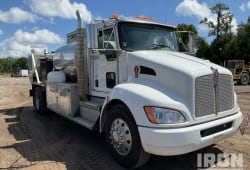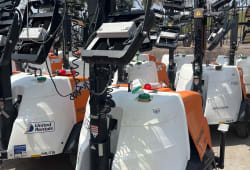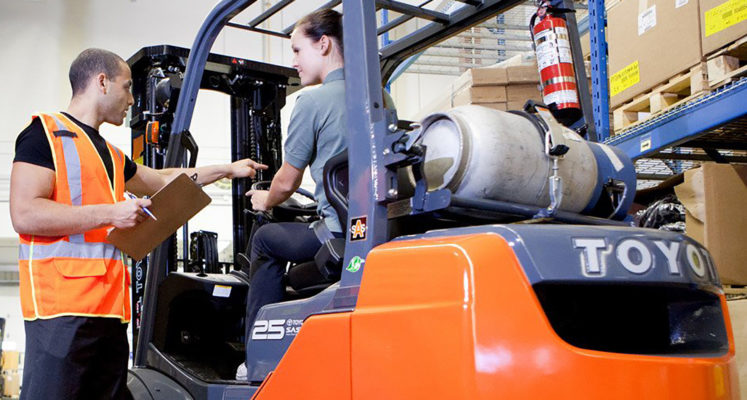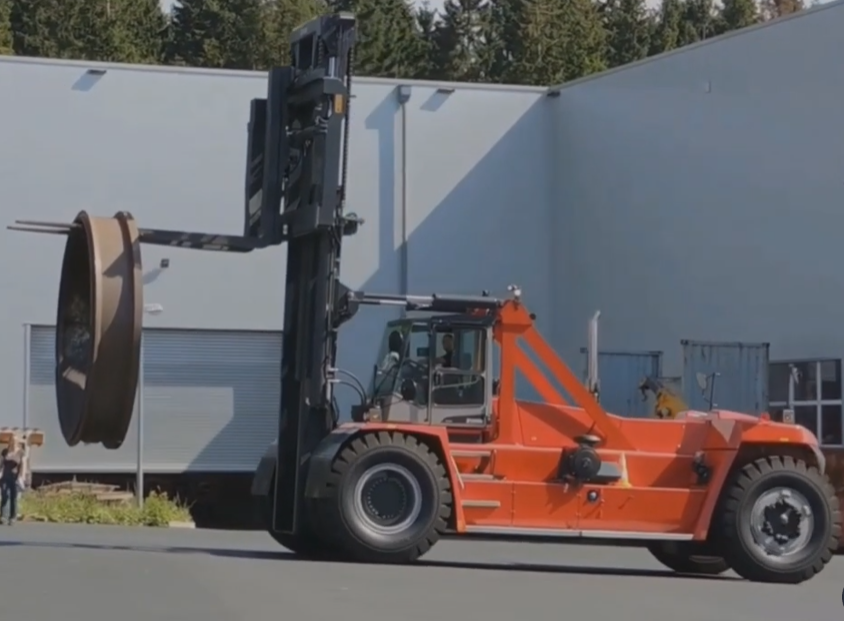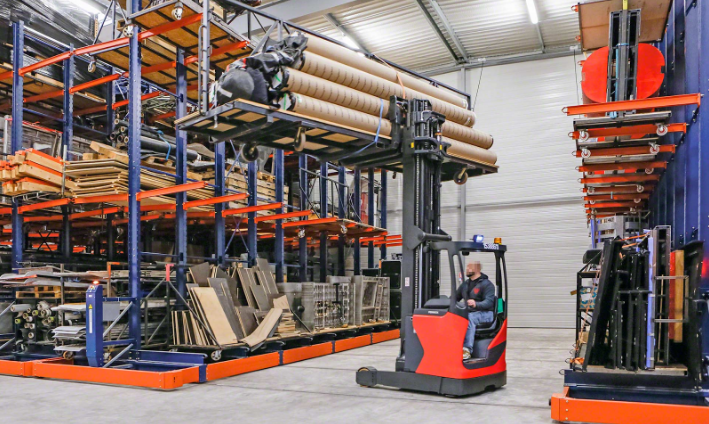Common Forklift Maintenance Mistakes to Avoid
7 Min read
)
June 11, 2023
Forklifts are an essential piece of equipment in many workplaces. They can be used to move heavy objects quickly and easily, which can help to improve productivity. However, forklifts can also be dangerous if they are not properly maintained. Forklift accidents are a leading cause of workplace injuries and fatalities.
By avoiding these common forklift maintenance mistakes, you can help to keep your forklifts in safe operating condition and prevent accidents. In this blog post, we will discuss some of the most common forklift maintenance mistakes and how to avoid them. We will also provide some tips for keeping your forklifts in safe operating condition.
What is forklift maintenance?
Forklift maintenance is the care and upkeep of forklifts to ensure they are safe and reliable. It includes tasks like inspecting, cleaning, lubricating, and replacing parts. Proper forklift maintenance can help prevent accidents, extend the life of your forklifts, and save you money.
Why is forklift maintenance important?
Forklifts are an essential piece of equipment in many workplaces. They can be used to move heavy objects quickly and easily, which can help to improve productivity. However, forklifts can also be dangerous if they are not properly maintained. Forklift accidents are a leading cause of workplace injuries and fatalities.
Common forklift maintenance mistakes to Avoid
1. Not Inspecting Forklifts Regularly
Forklifts are powerful machines that can be dangerous if they are not properly maintained. One of the most important aspects of forklift maintenance is regular inspection. Forklifts should be inspected daily for signs of wear and tear. This includes checking the tires, brakes, steering, and other components.
What should be inspected on a forklift?
Tires: Check for wear, cracks, and bulges.
Brakes: Check for leaks, sponginess, and uneven braking.
Steering: Check for looseness, binding, and excessive play.
Other components: Check for any other signs of wear and tear, such as loose bolts, damaged hoses, and cracked lenses.
How often should a forklift be inspected?
Forklifts should be inspected daily. This is especially important for forklifts that are used heavily. If a forklift is not inspected daily, it could develop problems that could lead to an accident.
Consequences of not inspecting a forklift regularly
If a forklift is not inspected regularly, it could develop problems that could lead to an accident. Some of the consequences of not checking a forklift regularly include:
Accidents: Forklift accidents are a leading cause of workplace injuries and fatalities.
Property damage: Forklifts that are not properly maintained can damage property, such as walls, floors, and equipment.
Increased downtime: Forklifts that are not properly maintained are more likely to break down, which can lead to increased downtime.
Increased costs: Forklifts that are not properly maintained are more likely to need expensive repairs, which can increase costs.
By inspecting forklifts regularly, you can help to prevent accidents, damage, downtime, and costs.
2. Neglecting Forklift Batteries
H Forklift batteries are an essential part of any forklift. They provide the power that the forklift needs to operate. However, forklift batteries can be expensive to replace, and they can also be dangerous if they are not properly maintained.
How often should forklift batteries be maintained?
Forklift batteries should be maintained regularly. The frequency of maintenance will depend on the type of battery and the environment in which it is used. However, it is generally recommended that forklift batteries be inspected and serviced at least once a month.
What are the signs of a bad forklift battery?
A few signs indicate that a forklift battery may be bad. These signs include:
The battery does not hold a charge for very long.
The battery takes a long time to charge.
The battery produces a lot of smoke or fumes.
The battery leaks fluid.
Consequences of neglecting forklift batteries
If a forklift battery is not properly maintained, it can lead to several problems. These problems include:
The battery may not be able to provide enough power to the forklift, which can lead to breakdowns.
The battery may overheat, which can be dangerous.
The battery may leak acid, which can be corrosive and dangerous.
The battery may catch fire, which can be deadly.
To avoid these problems, it is important to properly maintain your forklift batteries. This includes inspecting the batteries regularly, charging them properly, and replacing them when they are no longer able to hold a charge. By following these simple steps, you can help to ensure that your forklift batteries last for many years to come.
3. Failing to Replace Worn Parts
What are the signs of worn forklift parts?
Loose or wobbly parts: Worn parts can become loose or wobbly, which can make the forklift unstable and dangerous to operate.
Leaking fluids: Worn parts can leak fluids, which can create a slippery hazard and damage the forklift.
Damaged or missing components: Worn parts can become damaged or missing, which can affect the forklift's performance and make it unsafe to operate.
How often should forklift parts be replaced?
The frequency with which forklift parts should be replaced depends on the type of part and the severity of wear. However, in general, forklift parts should be replaced regularly to ensure that the forklift is safe to operate.
Consequences of failing to replace worn forklift parts
Failing to replace worn forklift parts can have serious consequences, including:
Accidents: Forklift accidents are a leading cause of workplace injuries and fatalities. Worn parts can make forklifts unstable and difficult to control, which can increase the risk of accidents.
Property damage: Worn parts can damage other equipment and property, which can lead to costly repairs.
Downtime: When a forklift breaks down, it can cause downtime for the entire operation. This can lead to lost productivity and revenue.
By following a regular maintenance schedule and replacing worn parts immediately, you can help to prevent accidents, protect your property, and keep your forklifts running smoothly.
4. Not Training Forklift Operators
Who should be trained on forklift safety?
Everyone who operates a forklift.
Anyone who works in an area where forklifts are used.
Even if you've been operating a forklift for years, it's important to stay up-to-date on safety procedures.
What should be included in forklift training?
The basics of forklift operation.
How to avoid accidents.
How to respond to emergencies.
The importance of safety gear.
The consequences of not following safety procedures.
Don't risk it! make sure all forklift operators are properly trained. It could save your life.
5. Allowing Forklifts to be Operated by Unqualified Personnel
Who is qualified to operate a forklift?
Forklifts are powerful machines that can be dangerous if not operated by qualified personnel. Only people who have been trained and certified to operate a forklift should be allowed to do so. Allowing unqualified personnel to operate a forklift can have serious consequences, including:
Incidents: Forklift accidents are a leading cause of workplace injuries and fatalities. When unqualified personnel operates forklifts, they are more likely to make mistakes that can lead to accidents.
Property Damage: Forklifts can cause significant damage to property if they are not operated properly. Unqualified personnel are more likely to damage property when operating forklifts.
Fines and penalties: Employers who allow unqualified personnel to operate forklifts can be fined and penalized by the government.
To prevent unqualified personnel from operating forklifts, employers should:
Require all forklift operators to be trained and certified.
Post signs in the workplace that state that only trained and certified personnel are allowed to operate forklifts.
Conduct regular inspections to ensure that only trained and certified personnel are operating forklifts.
By taking these steps, employers can help to prevent accidents, injuries, and property damage caused by unqualified forklift operators.
How much does it cost to repair forklifts?
The cost of repairing a forklift can vary depending on the type of forklift, the severity of the damage, and the location of the repair shop. In general, however, forklift repairs can range from a few hundred dollars to several thousand dollars.
In addition to the cost of parts, there is also the cost of labor. The cost of labor for forklift repairs can range from $50 to $100 per hour, depending on the location of the repair shop.
If you are considering repairing a forklift, it is essential to get estimates from several different repair shops. This will help you to ensure that you are getting the best possible price for the repair.
Conclusion
In conclusion, several common forklift maintenance mistakes can lead to accidents, injuries, and property damage. By avoiding these mistakes, you can help to keep your forklifts in safe operating condition and prevent accidents.
Replacing worn parts ensures stability and safe operation while providing training to operators reduces the risk of accidents. By following these practices, organizations can enhance safety, minimize property damage, and avoid costly downtime. Prioritizing forklift maintenance and operator training is key to a productive and secure work environment.

Caleb Woods is an experienced content specialist and an editor at Boom & Bucket, blending his journalism background with expertise in the heavy equipment industry. He delivers engaging, informative content to help professionals stay informed and make smarter decisions in the machinery market.


